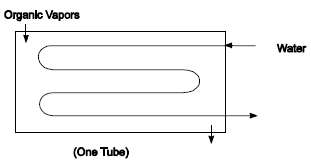A horizontal shell-and-tube heat exchanger is used to condense organic vapors. The organic vapors condense on the
Question:
A horizontal shell-and-tube heat exchanger is used to condense organic vapors. The organic vapors condense on the outside of the tubes. Water is used as the cooling medium on the inside of the tubes. The condenser tubes are 1.9 cm O.D., 1.6 cm ID copper tubes, 2.4 m in length. There are a total of 768 tubes. The water makes four passes through the exchanger. Test data obtained when the unit was first placed into service are as followsWater rate = 3700 l/minInlet water temperature = 29?COutlet water temperature = 49?COrganic-vapor condensation temperature = 118?CAfter 3 months of operation, another test, made under the same conditions as the first, i.e., same water rate and inlet temperature and same condensation temperature, showed that the exit water temperature was 46?C.(a) What is the tube-side-fluid (water) velocity?(b) What is the effectiveness, e, of the exchanger at the time of the first and second test?(c) Assuming no changes in either the inside transfer coefficient on the condensing coefficient and negligible shell-side fouling, and no fouling at the time of the first test, estimate the tube-side fouling coefficient at the time of the second test.GIVENA shell-and-tube exchanger, organic vapors condensing in shell, water in copper tubesTube diametersDo = 1.9 cm = 0.019 mDi = 1.6 cm = 0.016 mTube length (L) = 2.4 mNumber of tubes (N) = 768Number of tube passes (Np) = 4Water flow rate (vw) = 3700 1/min = 3.7 m3/minWater temperaturesTw,in = 29?CTw,out = 49?COrganic vapor condensation temperature (Tc) = 118?CAfter 3 months: Tw,out = 46?CASSUMPTIONSNo fouling at the time of the first testNo change in the inside and outside heat transfer coefficientsNegligible shell-side foulingLength given is the length of one tube - all fourpasses

Step by Step Answer:

Principles of heat transfer
ISBN: 978-0495667704
7th Edition
Authors: Frank Kreith, Raj M. Manglik, Mark S. Bohn





